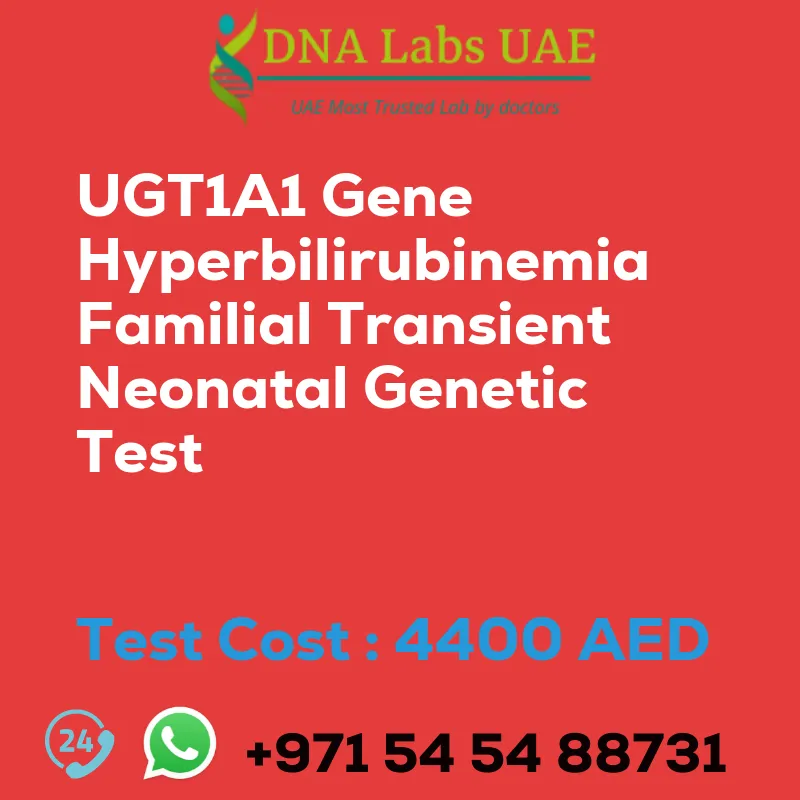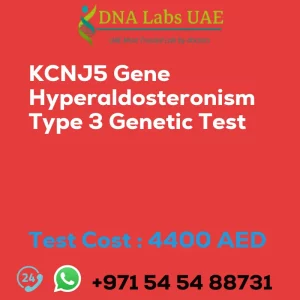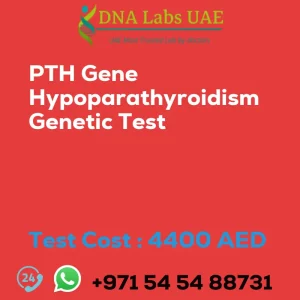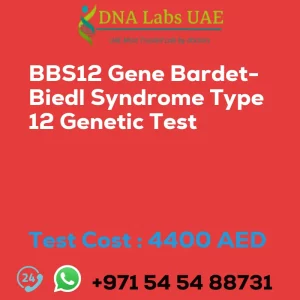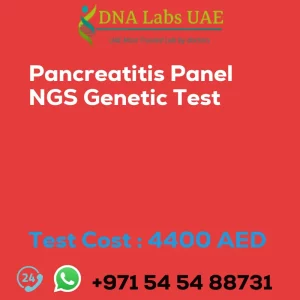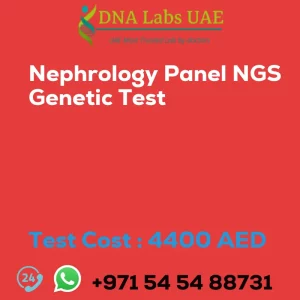UGT1A1 Gene Hyperbilirubinemia Familial Transient Neonatal Genetic Test
Are you concerned about UGT1A1 gene hyperbilirubinemia in your family? DNA Labs UAE offers a comprehensive genetic test to diagnose and provide valuable information about this condition.
Test Details
UGT1A1 gene hyperbilirubinemia, also known as Crigler-Najjar syndrome, is a rare genetic disorder characterized by high levels of bilirubin in the blood. Bilirubin is a yellow pigment that is produced when red blood cells are broken down. The UGT1A1 gene provides instructions for making an enzyme called uridine diphosphate glucuronosyltransferase 1A1. This enzyme is responsible for attaching a molecule called glucuronic acid to bilirubin, which allows it to be excreted from the body. Mutations in the UGT1A1 gene can lead to reduced or absent activity of the enzyme, resulting in the buildup of unconjugated bilirubin in the blood.
Familial transient neonatal hyperbilirubinemia is a milder form of UGT1A1 gene hyperbilirubinemia. It is characterized by jaundice (yellowing of the skin and eyes) in the first few days after birth, which usually resolves on its own within a few weeks. Unlike Crigler-Najjar syndrome, which is a lifelong condition, familial transient neonatal hyperbilirubinemia is temporary and does not typically cause long-term complications.
NGS genetic testing, or next-generation sequencing genetic testing, is a type of genetic test that can analyze multiple genes simultaneously. It uses advanced sequencing technology to identify mutations or variations in the DNA sequence of genes, including the UGT1A1 gene. NGS genetic testing can help diagnose UGT1A1 gene hyperbilirubinemia and determine the specific genetic mutation causing the condition.
Test Components and Price
Test Name: UGT1A1 Gene Hyperbilirubinemia Familial Transient Neonatal Genetic Test
- Components: NGS Technology
- Price: 4400.0 AED
- Sample Condition: Blood or Extracted DNA or One drop Blood on FTA Card
- Report Delivery: 3 to 4 Weeks
Test Department and Doctor
Test Department: Genetics
Doctor: General Physician
Pre Test Information
Prior to the UGT1A1 gene hyperbilirubinemia genetic test, it is important to provide the clinical history of the patient. A genetic counseling session will be conducted to draw a pedigree chart of family members affected by UGT1A1 gene hyperbilirubinemia. This will help in understanding the inheritance pattern and guide treatment decisions.
Importance of Genetic Testing
Genetic testing for UGT1A1 gene hyperbilirubinemia can be useful in confirming a diagnosis, providing information about the inheritance pattern, and guiding treatment decisions. It can also be helpful for genetic counseling and family planning, as it can determine the likelihood of passing the condition on to future children.
It’s important to note that genetic testing should be done under the guidance of a healthcare professional, such as a genetic counselor or a medical geneticist, who can help interpret the results and provide appropriate recommendations.
| Test Name | UGT1A1 Gene Hyperbilirubinemia familial transient neonatal Genetic Test |
|---|---|
| Components | |
| Price | 4400.0 AED |
| Sample Condition | Blood or Extracted DNA or One drop Blood on FTA Card |
| Report Delivery | 3 to 4 Weeks |
| Method | NGS Technology |
| Test type | Hepatology Nephrology Endocrinology Disorders |
| Doctor | General Physician |
| Test Department: | Genetics |
| Pre Test Information | Clinical History of Patient who is going for UGT1A1 Gene Hyperbilirubinemia, familial transient neonatal NGS Genetic DNA Test. A Genetic Counselling session to draw a pedigree chart of family members affected with UGT1A1 Gene Hyperbilirubinemia, familial transient neonatal NGS Genetic DNA Test gene UGT1A1 |
| Test Details | UGT1A1 gene hyperbilirubinemia, also known as Crigler-Najjar syndrome, is a rare genetic disorder characterized by high levels of bilirubin in the blood. Bilirubin is a yellow pigment that is produced when red blood cells are broken down. The UGT1A1 gene provides instructions for making an enzyme called uridine diphosphate glucuronosyltransferase 1A1. This enzyme is responsible for attaching a molecule called glucuronic acid to bilirubin, which allows it to be excreted from the body. Mutations in the UGT1A1 gene can lead to reduced or absent activity of the enzyme, resulting in the buildup of unconjugated bilirubin in the blood. Familial transient neonatal hyperbilirubinemia is a milder form of UGT1A1 gene hyperbilirubinemia. It is characterized by jaundice (yellowing of the skin and eyes) in the first few days after birth, which usually resolves on its own within a few weeks. Unlike Crigler-Najjar syndrome, which is a lifelong condition, familial transient neonatal hyperbilirubinemia is temporary and does not typically cause long-term complications. NGS genetic testing, or next-generation sequencing genetic testing, is a type of genetic test that can analyze multiple genes simultaneously. It uses advanced sequencing technology to identify mutations or variations in the DNA sequence of genes, including the UGT1A1 gene. NGS genetic testing can help diagnose UGT1A1 gene hyperbilirubinemia and determine the specific genetic mutation causing the condition. Genetic testing for UGT1A1 gene hyperbilirubinemia can be useful in confirming a diagnosis, providing information about the inheritance pattern, and guiding treatment decisions. It can also be helpful for genetic counseling and family planning, as it can determine the likelihood of passing the condition on to future children. It’s important to note that genetic testing should be done under the guidance of a healthcare professional, such as a genetic counselor or a medical geneticist, who can help interpret the results and provide appropriate recommendations. |

